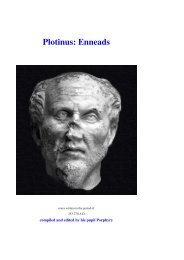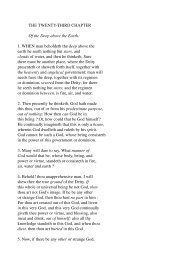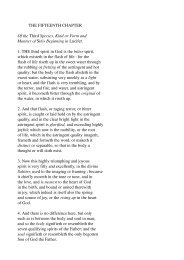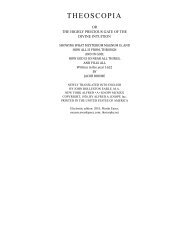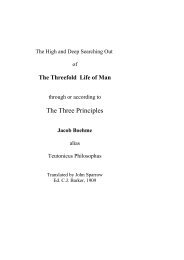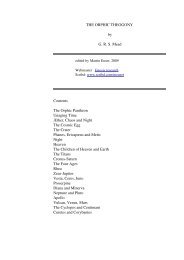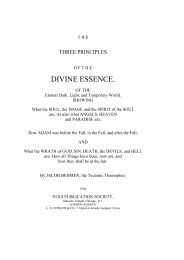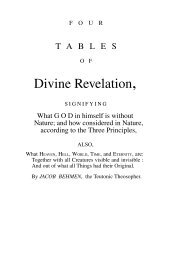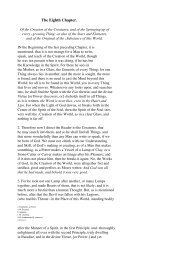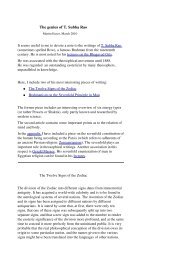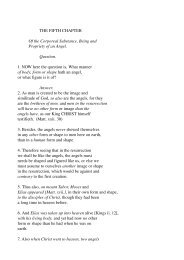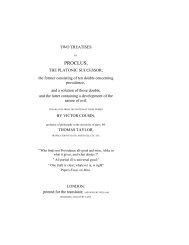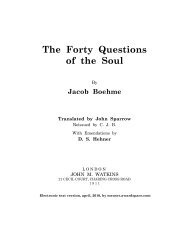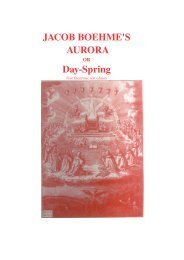Gerald Massey's Lectures - Society in evolution - Awardspace
Gerald Massey's Lectures - Society in evolution - Awardspace
Gerald Massey's Lectures - Society in evolution - Awardspace
You also want an ePaper? Increase the reach of your titles
YUMPU automatically turns print PDFs into web optimized ePapers that Google loves.
himself as a will<strong>in</strong>g sacrifice for this purpose, and he was transformed by magical<br />
<strong>in</strong>cantations <strong>in</strong>to the New Moon. The symbolism is identical, whether derived from Egypt<br />
or not. So is it when the Buddha offers his body as a sacrifice, and transforms himself<br />
<strong>in</strong>to the lunar hare.<br />
The Maories have a tradition of the first children of earth, <strong>in</strong> which they relate that the<br />
earliest subject of human thought was the difference between light and darkness; they<br />
were always th<strong>in</strong>k<strong>in</strong>g what might be the difference betwixt light and darkness. Naturally,<br />
the primary conditions of existence observed by primitive men were those that were most<br />
observable, and, foremost amongst these, were the phenomena of the day and the dark,<br />
which followed each other <strong>in</strong> ceaseless change. Mythology beg<strong>in</strong>s with this vague and<br />
merely elemental phase of external phenomena, alternat<strong>in</strong>g <strong>in</strong> night and day. In a<br />
secondary stage, it was observed that the battle field of this never end<strong>in</strong>g warfare of day<br />
and dark was focussed and brought to a def<strong>in</strong>ite po<strong>in</strong>t <strong>in</strong> the orb of the moon, where the<br />
struggle betwixt the two personified powers of light and darkness went on and on for<br />
ever, each power hav<strong>in</strong>g its triumph over the other <strong>in</strong> its turn,--these be<strong>in</strong>g depicted <strong>in</strong><br />
one representation as the solar light and the serpent of darkness, <strong>in</strong> another by the lion<br />
and the unicorn. These phenomena of light and darkness were at first set forth by means<br />
of animals, reptiles, birds, and other primitive types of the elemental powers; and lastly<br />
the human type was adopted, and the cunn<strong>in</strong>g of the crocodile, or the jackal of darkness,<br />
is represented by the Egyptian Sut, the Norse Loki, the Greek Hermes, or the Jewish<br />
Jacob, the dark deceiver; and to-day, we f<strong>in</strong>d the Christian Evidence <strong>Society</strong> engaged <strong>in</strong><br />
defend<strong>in</strong>g such characters as that of Jacob, <strong>in</strong> the full and perfect belief that Jacob was a<br />
human be<strong>in</strong>g, and one of God's chosen race. Whereas, he was no more a person than was<br />
Sut-Anup <strong>in</strong> Egypt, or Reynard the fox <strong>in</strong> Europe! The human form, like that of the<br />
earlier animal type, was only representative of some power manifested <strong>in</strong> natural<br />
phenomena. This mode of representation was known when these sacred stories were first<br />
told of mythical characters; it was afterwards cont<strong>in</strong>ued and taught <strong>in</strong> the so-called<br />
"mysteries" by means of the Gnosis. When the art or Gnosis was lost to the world<br />
outside, the ancient histories were ignorantly supposed to be human <strong>in</strong> their orig<strong>in</strong>;<br />
mythology was euhemerized (that is, the ideal was mistaken for the real), and Egyptian<br />
mythology was converted <strong>in</strong>to Hebrew miracles and Christian history.<br />
Thus when the Iroquois Indians claim that the first ancestor of the red man was a hare, we<br />
do not know what that say<strong>in</strong>g means until we learn the representative value of the<br />
symbol! So is it all sign-writ<strong>in</strong>g through.<br />
When Herodotus went to Egypt, he recognized the orig<strong>in</strong>als of the gods that were adored,<br />
amplified, embellished, or laughed at <strong>in</strong> Greece. At present, however, the Müllerites dare<br />
not mention Egypt, but look askance at those who do. Here is a crucial <strong>in</strong>stance of<br />
survival, evidenced by philology,--the name of Mars as Ares will serve to prove how<br />
Egyptian underlies the Greek! The planet Mars is called Har-Tesh <strong>in</strong> Egyptian, which<br />
signifies the red lord, or the lord of gore. Cedrenus writes the name of Arês as Hartosi,<br />
and Vettius Valens as Hartes, whence Artis, and f<strong>in</strong>ally Arês. Aga<strong>in</strong>, the name of Hera<br />
denotes the heaven, over, <strong>in</strong> Egyptian; which certa<strong>in</strong>ly describes the nature of the Greek<br />
goddess of that name.<br />
When we are told by the Roman Catholic Egyptologist, Renouf, that "Neither Hebrews<br />
nor Greeks borrowed any of their ideas from Egypt," we can only th<strong>in</strong>k of such a dictum<br />
as an <strong>in</strong>tentional bl<strong>in</strong>d, or as a result of putt<strong>in</strong>g up the glass to an eye that cannot see. It is<br />
simply impossible for the non-<strong>evolution</strong>ist, the bigotted Bibliolator, or the Müllerite, to<br />
<strong>in</strong>terpret or to understand the mythology of Egypt. Its roots go deep, and its branches<br />
spread too far, for their range of thought. And now, let me offer a remarkable example of<br />
the modes <strong>in</strong> which the Egyptians expressed or t<strong>in</strong>ged their thoughts, by means of<br />
external phenomena. The sun-god Ra is represented as possess<strong>in</strong>g fourteen spirits or<br />
kaus, the liv<strong>in</strong>g likenesses and glorified images of himself. These are portrayed as



